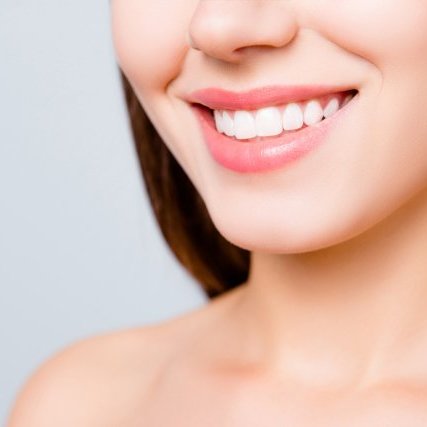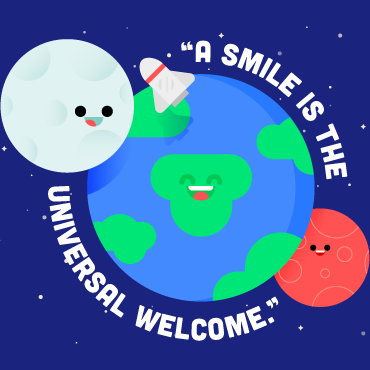Flossing can require practice to ensure that it is being done properly and without causing damage to the gums. One way to help teach this technique to a child is to use a sample piece of floss on hands as a demonstration.
A large majority of dental anxiety is rooted in a fear of pain. That's where a sedation dentist can help. A sedation dentist will match your sedative to your specific needs and medical history to give you a pain free visit to help deal with your dental anxiety.
If you have a tooth removed, it is important to have it replaced with a bridge or implant. If not, the teeth adjacent to the space will begin to move into the void, and the tooth above the gap will continue to grow, causing countless problems.
Did you know that lasers have been approved for use in dental procedures since the 1990s? They were first approved for use on gums and soft tissues, but later received approval for use on hard surfaces, like teeth.
Do you know that the origination of a dental implant dates back to Mayan civilization around 600 AD? During those times, tooth-like shells were used as implants.
If your child has never been to the dentist and is apprehensive about visiting, schedule a "get-to-know-you" visit. Your dentist will explain what goes on, show him or her the different tools, and create that initial friendly bond that will make future visits easier.
As early as 201 A.D., the Romans were dental experts. They used gold crowns, fixed bridgework, and a paste made of ground eggshells and honey to clean their teeth.
Even if your wisdom teeth aren't causing pain, they may need to be extracted. If they are not erupting correctly, or are not in a position to be cleaned properly, they may cause problems later.
While it may seem as though you should brush your teeth right after you eat, this is actually not recommended. It is best to wait at least 30 minutes.
Did you know that our mouth’s condition reflects our overall health? For instance, unusual erosion of tooth enamel could be caused by more serious underlying conditions such as acid reflux and teeth grinding. This is why it is necessary to seek a dentist’s advice, as they can refer you to other specialists.
Teeth are labeled according to position. From front to back, they are the: central incisor, lateral incisor, cuspid or canine, first bicuspid or first premolar, second premolar or second bicuspid, first molar, second molar, and finally, third molar or wisdom tooth.
Do you notice people with beautiful, white teeth and wish you had the genetics to produce sparkling teeth? The truth is that many people get help from various procedures to improve the appearance of their teeth. We'll be happy to talk to you about the options.
Laser dentistry offers many benefits over traditional dentistry. For one thing, the use of the laser decreases post-operative tissue sensitivity, thus helping speed up recovery time. In addition, the patient experiences much less discomfort during the procedure as well.
Do you replace your toothbrush after you’ve been sick? Experts say that you should replace your toothbrush after you have an episode of the flu, cold, or any other viral infection. Notorious microbes can implant themselves on the toothbrush bristles, leading to re-infection.
According to the Bureau of Labor Statistics, dentists comprise half of the top 10-highest-paying professions in the US. Dental surgeons top the list with more than $166,400 median salary, while general and specialty dentists occupy the fifth and sixth slots.
When making your toothpaste purchase, select brands that contain fluoride, especially if your municipal water supply does not contain any, or if you drink a lot of bottled water. Fluoride helps teeth retain calcium, keeping them strong and slowing the production of enamel-eating acids.
A dentist is not just concerned with treating dental disorders. Your dentist also cares about your overall dental hygiene and your dental care routine to make sure there aren’t any abnormalities that can lead to severe complications.
Your teeth are harder than your bones, but unlike bones, your teeth don’t heal themselves. Because tooth damage is irreversible, it’s important to see your dentist as often as you can.
Until the mid-18th century, the dental profession went by various names. Some of the most common designations included barber-surgeon, operator for the teeth and surgeon dentis [sic]. The term dentist didn’t move into widespread use until the late 1760s.
When you visit our clinic, we’ll likely ask you if any specific activity tends to trigger your jaw pain, and whether it’s difficult to open your mouth normally.
Are you unsure about the best toothbrush and flossing system for your teeth? We can recommend how to care for your teeth so they stay clean and plaque-free all year long.
How long do you brush your teeth each time? A good practice is to brush twice daily for at least two minutes. Do that for 40 years and you will have spent nearly 40 days brushing your teeth!
Did you know that archaeologists have evidence of dental work in teeth dating back more than 5,000 years, indicating that dental awareness may have begun in the Neolithic period?
Periodontal disease is usually accompanied by a variety of symptoms like bleeding gums, loose or separating teeth, and bad breath. But sometimes, the disease doesn’t come with observable symptoms which is why regular dental visits are necessary.
Root canals aren't all that bad. In fact, according to a recent study, almost two-thirds of those surveyed said they would rather have one than sit next to a person talking on a mobile phone.
Do you know that there are more bacteria in the human mouth than there are people on the Earth? In fact, a single mouth can be home to more than 6 billion bacteria.
Some people may think mouthwash is an optional part of oral hygiene, but using it has many benefits. Mouthwash can clean the mouth even further, reduce acidity, and re-mineralize the teeth. It is also ideal to use when a toothbrush and floss are unavailable.
Intrinsic discoloration occurs below the surface of the teeth, and can be caused by a childhood illness, medications, aging, tooth trauma, or infection. Whitening for intrinsic discoloration requires professional assistance.
Periodontal disease is inflammation caused by plaque which can affect the surrounding area of the tooth. It can range from simple gum inflammation to serious disease that can affect your overall health. Brushing and flossing twice a day is the first defense against periodontal disease.
When you smile in front of a mirror, you’re only seeing two-thirds of your teeth. The rest is hidden inside the gums. Gums should never be neglected and should be part of your daily dental health care routine.
Are silver amalgam fillings safe? Yes, amalgam fillings are safe. A great deal of research has found these fillings to be an effective, long-lasting treatment for dental decay.
Elephants have the largest teeth of any animal in the world. Their tusks are actually incisors that come from the upper jaw, and only two-thirds of them are visible. The heaviest pair of tusks ever recorded weighed over 400 pounds.
No judgement - when was the last time you bought a new toothbrush? It's good to replace it every 2-3 months or if you have been ill. It's also a good idea to store it far from the toilet for optimum hygiene.
What is tartar? This is dental plaque (soft biofilm deposits in the mouth) that eventually hardens. While plaque is colorless, tartar is yellowish or brownish because it becomes stained. Also, tartar cements itself to teeth so only dental professionals can remove it.
Do you have a number of cavities or other procedures you’d like done in one appointment? Sedation dentistry makes that possible because the dentist can operate more efficiently when there are no interruptions from the patient.
When it is time to floss your teeth, you will want to break off enough floss that you can easily hold onto while you are flossing your teeth.
Though both bones and teeth are made of calcium, teeth cannot repair or regenerate themselves like bones. In fact, the tooth is the only part of the body that can’t heal itself. So, be sure to take good care of them.
If you don’t like to visit the dentist unless there’s something wrong with your teeth, you could be sacrificing the health of your gums. Let’s talk about how coming in for a cleaning every six months can help you avoid periodontal disease.
Can you really whiten your teeth on your own? Somewhat. Over-the-counter whitening products may lighten stains like coffee and tea, but the color of the tooth will not change. That's a job for a professional.
At what age should your child first see a dentist? According to the American Dental Association (ADA), your child should see a dentist by their first birthday.
Having a phobia about visiting the dentist, even for a minor procedure like teeth cleaning, is not unusual, and you are not alone if you are anxious about your visit. We understand completely and do not take it personally. However, with the different types of sedation available, we can help you cope with your anxiety and receive the treatment you should have.
When were mass-produced toothbrushes first created? Not until the late 1700s. Until that time, most toothbrushes were imported into Europe from China. Many other regions and cultures also continued to chew on sticks before mass-produced toothbrushes became common.
It’s important to remember that there are constant advances in dentistry. If you have an issue with your gums that you didn’t believe was operable in the past, it may be that the use of laser dentistry now makes your issue an outpatient procedure.
According to the National Institutes of Health, “TMD should be treated like any other musculoskeletal complaint. If TMJ/TMD is left untreated, symptoms can worsen and extend far beyond the jaw and mouth area.”
Researchers now understand the connection between tooth and gum health and the rest of your body. Brushing your teeth can reduce the chances of getting diabetes or developing heart disease.
If you or a family member are an ice chewer, you may want to rethink the habit. Chewing ice places undue stress on teeth and can cause them to chip or break.
It is important when brushing your teeth that you do not press too hard. This can cause damage to not only your teeth but also your gums.
Dental anxiety is a genuine condition, so don't let anyone tell you otherwise. Fortunately, there are a number of options available to help address this condition so you can get the care you need.
Chewing your food does more than prepare it for swallowing and digestion, it also contributes to healthy teeth. This is because it stimulates saliva production which then helps wash away teeth-staining particles.
Dental crowns are caps that restores the tooth to its normal shape, size, and function. These can be made of different materials. Two tooth-colored substitutes are all porcelain and porcelain fused to metal crowns.
Do you take medications on a regular basis? Some types contribute to tooth decay, so be diligent with your oral hygiene. If you want to know if what you've been prescribed can be a problem, give us a call and will fill you in.
Do you know where your buccinator muscles are? They are the muscles in the walls of the cheek. You REALLY wouldn't be able to smile or chew without them! They are also the first muscle babies learn to control - so they are a pretty important!
Do you take medications on a regular basis? Some types contribute to tooth decay, so be diligent with your oral hygiene. If you want to know if what you've been prescribed can be a problem, give us a call and will fill you in.
When you would visit the dentist as a child, were there any magazines that you looked forward to reading because we were the only place that had them? How about today - do you still check them out when you bring your children in for their appointments?
Levi Spear Parmly is credited as introducing modern dental floss in 1815. He promoted the use of a fine piece of silk to floss teeth. During WWII, Dentist Charles C. Bass developed nylon floss and is also credited with promoting the importance of flossing.
Do you know where your buccinator muscles are? They are the muscles in the walls of the cheek. You REALLY wouldn't be able to smile or chew without them! They are also the first muscle babies learn to control - so they are a pretty important!
Do you take medications on a regular basis? Some types contribute to tooth decay, so be diligent with your oral hygiene. If you want to know if what you've been prescribed can be a problem, give us a call and will fill you in.
The man who is generally called the "Father of Modern Dentistry" was French surgeon Pierre Fauchard, who in 1723 published a textbook of sorts on the practice of dentistry.
Did you know that the number of patients who are afraid of the dentist is as high as 20 percent? One of the biggest benefits of sedation dentistry is that it can make critical oral care much easier to tolerate.
When you would visit the dentist as a child, were there any magazines that you looked forward to reading because we were the only place that had them? How about today - do you still check them out when you bring your children in for their appointments?
Levi Spear Parmly is credited as introducing modern dental floss in 1815. He promoted the use of a fine piece of silk to floss teeth. During WWII, Dentist Charles C. Bass developed nylon floss and is also credited with promoting the importance of flossing.
Do you know where your buccinator muscles are? They are the muscles in the walls of the cheek. You REALLY wouldn't be able to smile or chew without them! They are also the first muscle babies learn to control - so they are a pretty important!













